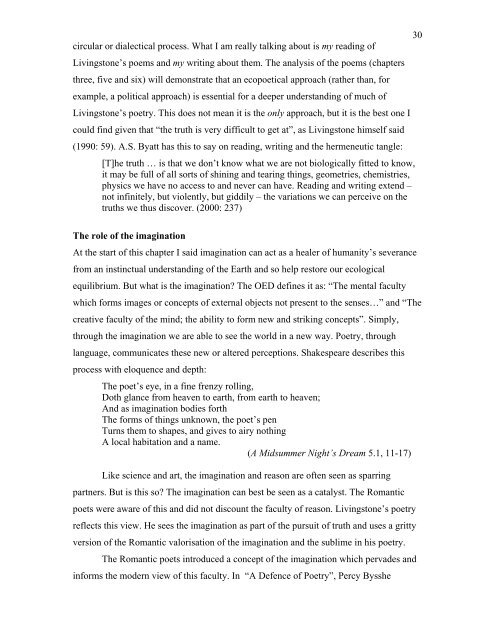"Symbiosis or Death": - Rhodes University
"Symbiosis or Death": - Rhodes University
"Symbiosis or Death": - Rhodes University
You also want an ePaper? Increase the reach of your titles
YUMPU automatically turns print PDFs into web optimized ePapers that Google loves.
30<br />
circular <strong>or</strong> dialectical process. What I am really talking about is my reading of<br />
Livingstone’s poems and my writing about them. The analysis of the poems (chapters<br />
three, five and six) will demonstrate that an ecopoetical approach (rather than, f<strong>or</strong><br />
example, a political approach) is essential f<strong>or</strong> a deeper understanding of much of<br />
Livingstone’s poetry. This does not mean it is the only approach, but it is the best one I<br />
could find given that “the truth is very difficult to get at”, as Livingstone himself said<br />
(1990: 59). A.S. Byatt has this to say on reading, writing and the hermeneutic tangle:<br />
[T]he truth … is that we don’t know what we are not biologically fitted to know,<br />
it may be full of all s<strong>or</strong>ts of shining and tearing things, geometries, chemistries,<br />
physics we have no access to and never can have. Reading and writing extend –<br />
not infinitely, but violently, but giddily – the variations we can perceive on the<br />
truths we thus discover. (2000: 237)<br />
The role of the imagination<br />
At the start of this chapter I said imagination can act as a healer of humanity’s severance<br />
from an instinctual understanding of the Earth and so help rest<strong>or</strong>e our ecological<br />
equilibrium. But what is the imagination? The OED defines it as: “The mental faculty<br />
which f<strong>or</strong>ms images <strong>or</strong> concepts of external objects not present to the senses…” and “The<br />
creative faculty of the mind; the ability to f<strong>or</strong>m new and striking concepts”. Simply,<br />
through the imagination we are able to see the w<strong>or</strong>ld in a new way. Poetry, through<br />
language, communicates these new <strong>or</strong> altered perceptions. Shakespeare describes this<br />
process with eloquence and depth:<br />
The poet’s eye, in a fine frenzy rolling,<br />
Doth glance from heaven to earth, from earth to heaven;<br />
And as imagination bodies f<strong>or</strong>th<br />
The f<strong>or</strong>ms of things unknown, the poet’s pen<br />
Turns them to shapes, and gives to airy nothing<br />
A local habitation and a name.<br />
(A Midsummer Night’s Dream 5.1, 11-17)<br />
Like science and art, the imagination and reason are often seen as sparring<br />
partners. But is this so? The imagination can best be seen as a catalyst. The Romantic<br />
poets were aware of this and did not discount the faculty of reason. Livingstone’s poetry<br />
reflects this view. He sees the imagination as part of the pursuit of truth and uses a gritty<br />
version of the Romantic val<strong>or</strong>isation of the imagination and the sublime in his poetry.<br />
The Romantic poets introduced a concept of the imagination which pervades and<br />
inf<strong>or</strong>ms the modern view of this faculty. In “A Defence of Poetry”, Percy Bysshe

















